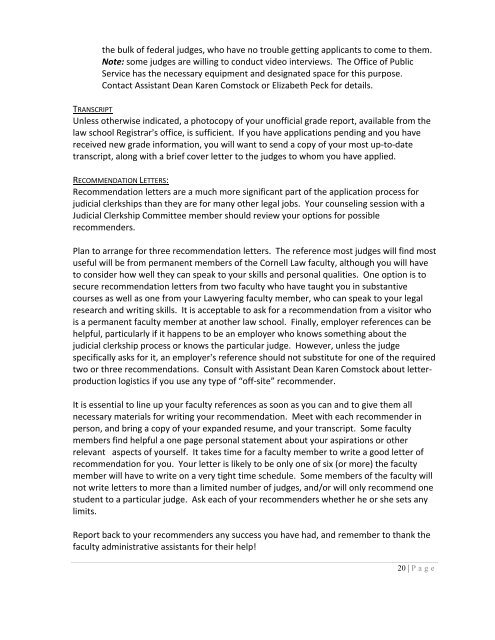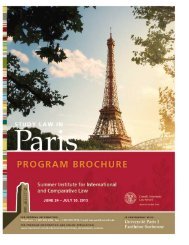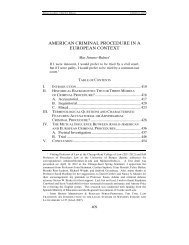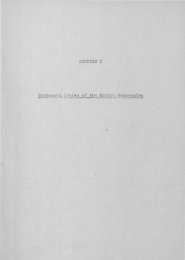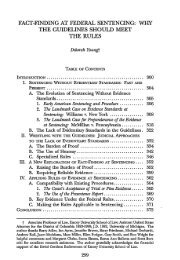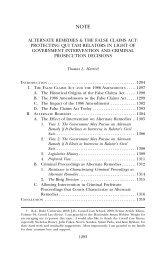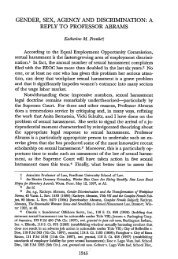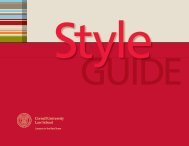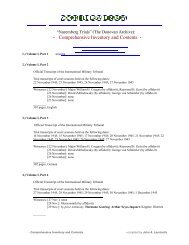JUDICIAL CLERKSHIP HANDBOOK - Cornell University Law School
JUDICIAL CLERKSHIP HANDBOOK - Cornell University Law School
JUDICIAL CLERKSHIP HANDBOOK - Cornell University Law School
You also want an ePaper? Increase the reach of your titles
YUMPU automatically turns print PDFs into web optimized ePapers that Google loves.
the bulk of federal judges, who have no trouble getting applicants to come to them.<br />
Note: some judges are willing to conduct video interviews. The Office of Public<br />
Service has the necessary equipment and designated space for this purpose.<br />
Contact Assistant Dean Karen Comstock or Elizabeth Peck for details.<br />
TRANSCRIPT<br />
Unless otherwise indicated, a photocopy of your unofficial grade report, available from the<br />
law school Registrar=s office, is sufficient. If you have applications pending and you have<br />
received new grade information, you will want to send a copy of your most up‐to‐date<br />
transcript, along with a brief cover letter to the judges to whom you have applied.<br />
RECOMMENDATION LETTERS:<br />
Recommendation letters are a much more significant part of the application process for<br />
judicial clerkships than they are for many other legal jobs. Your counseling session with a<br />
Judicial Clerkship Committee member should review your options for possible<br />
recommenders.<br />
Plan to arrange for three recommendation letters. The reference most judges will find most<br />
useful will be from permanent members of the <strong>Cornell</strong> <strong>Law</strong> faculty, although you will have<br />
to consider how well they can speak to your skills and personal qualities. One option is to<br />
secure recommendation letters from two faculty who have taught you in substantive<br />
courses as well as one from your <strong>Law</strong>yering faculty member, who can speak to your legal<br />
research and writing skills. It is acceptable to ask for a recommendation from a visitor who<br />
is a permanent faculty member at another law school. Finally, employer references can be<br />
helpful, particularly if it happens to be an employer who knows something about the<br />
judicial clerkship process or knows the particular judge. However, unless the judge<br />
specifically asks for it, an employer=s reference should not substitute for one of the required<br />
two or three recommendations. Consult with Assistant Dean Karen Comstock about letter‐<br />
production logistics if you use any type of “off‐site” recommender.<br />
It is essential to line up your faculty references as soon as you can and to give them all<br />
necessary materials for writing your recommendation. Meet with each recommender in<br />
person, and bring a copy of your expanded resume, and your transcript. Some faculty<br />
members find helpful a one page personal statement about your aspirations or other<br />
relevant aspects of yourself. It takes time for a faculty member to write a good letter of<br />
recommendation for you. Your letter is likely to be only one of six (or more) the faculty<br />
member will have to write on a very tight time schedule. Some members of the faculty will<br />
not write letters to more than a limited number of judges, and/or will only recommend one<br />
student to a particular judge. Ask each of your recommenders whether he or she sets any<br />
limits.<br />
Report back to your recommenders any success you have had, and remember to thank the<br />
faculty administrative assistants for their help!<br />
20 | P age


